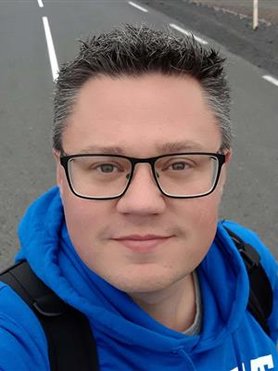

Dr. S.J. (Sebastiaan) de Vet
Dr. S.J. (Sebastiaan) de Vet
Profile
Biography
As a planetary geomorphologist I am fascinated by rocks and landscapes, both on Earth and other planetary bodies in the Solar System. I studied the interdisciplinary Bèta-Gamma Bachelor and did my MSc in Earth Sciences (cum laude), both in Amsterdam. In 2013 I defended my PhD, for which I studied the environmental fate of materials formed by volcanic eruptions under ice sheets and explored the parallels between Iceland and Mars. I have flown on parabolic flights (microgravity, moon, Mars, Titan), participated in hypergravity research and was involved in the two mission of our Dutch astronaut to the International Space Station. In April 2020 I joined the Astrodynamics & Space Missions section as lecturer. I am also affiliated to Naturalis as honorary research associate to study meteorites, I chair the Netherlands Platform for Planetary Science (NPP) and I am the National Coordinator (PI) of the FRIPON-NL/DOERAK fireball camera network in the Netherlands.
Expertise
Understanding how geological materials and landforms leverage our understanding of planetary evolution is one of my main research interests. This requires the study of extra-terrestrial materials, such as meteorites, and landforms of planetary bodies. Although limited in absolute numbers, the six ‘Dutch’ meteorites tell a fascinating story of primitive, metamorphosed and differentiated planetary bodies, each representing a step in the story (during the first millions of years) of the growth to planethood. However, for the final stages in planetary evolution – spanning the scale of billions of years – landscapes can help us to study and tell this story. Internal and external processes that have affected a planetary surface have caused it to retain clues to the planet’s geologic, climatic, and possibly biologic past. Where meteoritics studies the earliest rocks, planetary geoscience studies their lasts transformations; both are highly complementary and timely endeavours in the ongoing exploration of our Solar System. In addition, these research fields also offer fascinating opportunities for upstream and downstream applications in planetary exploration. Methods involve laboratory experiments, fieldwork and modelling, which tie together compositional properties, morphometrics and process dynamics.In keywords: planetary science, geomorphology, aeolian research, glaciovolcanism, meteoritics, parabolic flight, fireballs, drones (UAVs cq. RPAS)
Expertise
Publications
-
2024
Conceptual approach to community-involved, drone-assisted meteorite searching: strategy to find fusion-crusted meteorites
A. Glazyrina / Z. Hamers / Quinn van der Schaar / S.J. de Vet
-
2024
-
2024
Finding the rocks: a machine learning strategy for drone-assisted meteorite searching for European fields and soils
H. Heinczinger / S.J. de Vet
-
2024
Influence of weather parameters on a fireball’s dark flight
Felix Bettonvil / Dušan Bettonvil / Tammo Jan Dijkema / Kees Habraken / Jacob Kuiper / Gert Jan Netjes / S.J. de Vet
-
2024
Morphometrics of regmaglypts based on a 3D Model of the fusion-crusted ordinary chondrite Broek in Waterland (L6)
L.A.V. Veithen / S.J. de Vet
-
Media
-
2024-01-30
Sebastiaan de vet in de media 2024
Appeared in: NRC Handeldblad
-
2023-02-19
Sebastiaan de Vet in de media 2023
Appeared in: Tubantia
-
2023-10-20
NEMO Science Museum
Appeared in: NEMO Science Museum
-
2022-12-15
De landschappen van Mars
Appeared in: NPO Radio 1 De Nacht van NTR
-
2022-08-25
Sebastiaan de Vet in de media 2022
Appeared in: de Volkskrant
Prizes
-
2023-5-30
2023 Planeth Meteorite Trust Award
Sebastiaan de Vet heeft de 2023 Planeth Meteorite Trust Award gewonnen van de Royal Astronomical Society. Hij kan hiermee een zomer-stagair ondersteunen die onderzoek gaat doen naar hoe drones recent gevallen meteorieten kunnen zoeken.
Ancillary activities
-
2023-05-01 - 2024-06-30
Consultancy / research and other